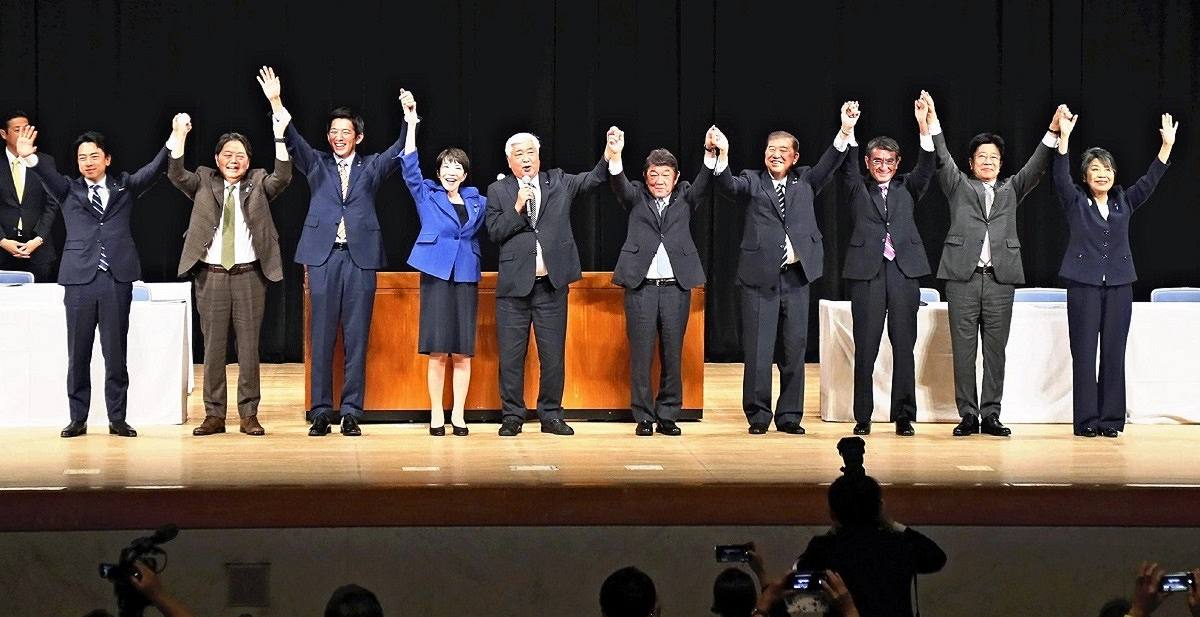Japan’s LDP Candidates Call for Boosting Government Spending But Do Not Explain Funding; Politicians Promise to Reduce Taxes, Combat Rising Prices

The candidates running for the Liberal Democratic Party’s presidential election line up on stage at a speech event in Matsuyama on Wednesday, along with LDP member Gen Nakatani, sixth from right.
15:22 JST, September 19, 2024
Candidates for the presidency of the ruling Liberal Democratic Party are increasingly calling for boosting government spending to stoke economic growth and reduce burdens on the people.
One candidate has even called for suspending tax hikes that the administration of Prime Minister Fumio Kishida established to fund defense spending. Fewer candidates have mentioned the importance of fiscal discipline. Despite the ongoing severe fiscal situation, the debate on how to fund government measures has not grown deeper.
“I am going to put forth a package of vital measures to combat rising prices by the end of this year. I will reduce the burden on young people from social insurance premiums,” former economic security minister Takayuki Kobayashi said emphatically during a speech in Matsuyama on Wednesday.
A major goal for him is to raise the wages of the working-age population and increase the growth potential of the nation’s industries, but he has not explained how to fund the measures.
LDP Secretary General Toshimitsu Motegi criticized the Finance Ministry for its focus on fiscal discipline and its typical practice of seeking to have the public shoulder the burden of implementing measures. Vowing to promote measures with “zero tax hikes,” he called for suspending ¥1 trillion each of increased taxes to strengthen the nation’s defense capabilities and added social insurance premiums to fund childcare support payments.
Because Motegi, as an LDP executive, was involved in making the decisions that created such measures as the defense spending tax hike, he has met criticism that he has changed his stance. Motegi said that the funds will be covered by a tax surplus which will be created as a result of higher-than-expected tax revenues due to economic growth, but the feasibility of this plan is unclear.
During a debate event in Kanazawa on Monday, former Environment Minister Shinjiro Koizumi said, “[The government] should not be overly concerned about a single-year primary balance and put a damper” on the country’s economic growth model.
The government expects to achieve the goal of bringing the combined primary budget balance of the central and local governments to a surplus in fiscal 2025. Koizumi has pledged to formulate a supplementary budget to cope with higher prices, raising the possibility that it may be more difficult to achieve the goal if he wins the LDP leadership election.
Digital minister Taro Kono has stressed fiscal discipline. On Monday, he remarked sardonically that “At election time, many [candidates] vow to provide benefits and subsidies, but they end up having almost no discussions on funding.”
The national debt, including government bonds, has continued to swell, exceeding ¥1,300 trillion as of the end of June.
“With interest rates gradually rising, Japan’s government debt is extremely large,” Kono said.
Top Articles in Politics
-

Japan PM Takaichi’s Cabinet Resigns en Masse
-

Sanae Takaichi Elected Prime Minister of Japan; Keeps All Cabinet Appointees from Previous Term
-

Japan’s Govt to Submit Road Map for Growth Strategy in March, PM Takaichi to Announce in Upcoming Policy Speech
-

LDP Wins Historic Landslide Victory
-

LDP Wins Landslide Victory, Secures Single-party Majority; Ruling Coalition with JIP Poised to Secure Over 300 seats (UPDATE 1)
JN ACCESS RANKING
-

Producer Behind Pop Group XG Arrested for Cocaine Possession
-

Japan PM Takaichi’s Cabinet Resigns en Masse
-

Japan Institute to Use Domestic Commercial Optical Lattice Clock to Set Japan Standard Time
-

Man Infected with Measles Reportedly Dined at Restaurant in Tokyo Station
-

Israeli Ambassador to Japan Speaks about Japan’s Role in the Reconstruction of Gaza





















